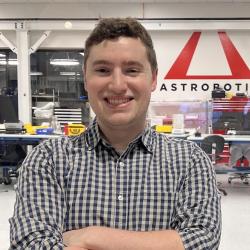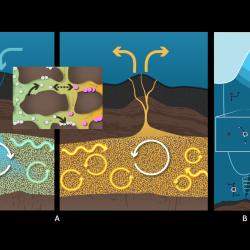Three UMD Astronomy Graduate Students Receive NASA Earth and Space Science Fellowships
Three University of Maryland astronomy graduate students have been awarded 2016 NASA Earth and Space Science Fellowships. The fellowship program supports continued training of a highly qualified workforce in disciplines needed to achieve NASA’s scientific goals.
J. Drew Hogg, Dana Louie and Zeeve Rogoszinski received the three-year awards, which provide $30,000 per year toward a stipend and expenses.
J. Drew Hogg, Ph.D. student in astronomy
Advisor: Christopher Reynolds, professor of astronomy and fellow of the Joint Space Science Institute
“Accretion Physics Through the Lens of the Observer: Connecting Fundamental Theory with Variability from Black Holes”
Hogg will study the physics of black hole growth with his fellowship. The strong gravitation of a black hole pulls in gas from its surrounding environment. As it gets close to the black hole, the gas begins to rotate rapidly, heat up and flatten into an accretion disk. This hot disk produces observable radiation that is highly variable, like a flickering light bulb. By running accretion disk simulations on UMD’s Deepthought2 supercomputer, Hogg intends to investigate the processes behind the variability. He hopes to use the variability as a high-fidelity probe of the complex gas physics near black holes. Hogg earned his bachelor’s degree in astronomy and physics from the University of Colorado Boulder.
Dana Louie, Ph.D. student in astronomy
Advisor: Astronomy Professor L. Drake Deming
“Understanding Super-Earth Atmospheres Through Simulations of Transiting Exoplanetary Atmospheric Spectroscopy”
By creating instrument simulators for the James Webb Space Telescope (JWST) and Hubble Space Telescope, Louie will design strategies to maximize the amount of scientific knowledge obtained from observing transiting super-Earth exoplanets. The Transiting Exoplanet Survey Satellite (TESS), which is scheduled for launch in August 2017, will detect bright, super-Earth exoplanet candidates. Louie’s strategies will allow her to provide input to the TESS team regarding the best candidates to study using the JWST, which is currently scheduled to launch in October 2018. Louie will also use the tools she develops to analyze the first transiting exoplanet data from the JWST, and she will help the TESS team choose options for an extended mission. Louie earned her bachelor’s degree in mechanical engineering from Ohio University and her master’s degree in physics from the University of Colorado Colorado Springs.
Zeeve Rogoszinski, Ph.D. student in astronomy
Advisor: Astronomy professor Douglas Hamilton
“Tilting Uranus Without a Collision”
Rogoszinski plans to investigate the origin of Uranus’ axial tilt, which is strangely positioned such that the planet is spinning on its side. Some scientists believe Uranus’ large tilt may be the result of a giant collision, but this model has some issues. Rogoszinski seeks to develop an alternative noncollisional model that requires only the gravitational interactions between Uranus and the giant planets. He will explore multiple initial solar system configurations to find a resonance—a match between the period of Uranus' axial precession, which is similar to the wobble of a spinning top, and the period of another planet's orbital precession—that is strong enough and lasts long enough to tip Uranus over as the solar system evolves. Determining a resonance will require Rogoszinski to run multiple planetary evolution simulations and calculate the change in the orientation of Uranus' spin axis. Rogoszinski earned his bachelor’s degree in astronomy and physics from Vassar College in Poughkeepsie, New York.
Media Relations Contact: Abby Robinson, 301-405-5845, abbyr@umd.edu
Writer: Mary Kearney
University of Maryland
College of Computer, Mathematical, and Natural Sciences
2300 Symons Hall,
College Park, MD 20742
www.cmns.umd.edu
@UMDscience
About the College of Computer, Mathematical, and Natural Sciences
The College of Computer, Mathematical, and Natural Sciences at the University of Maryland educates more than 7,000 future scientific leaders in its undergraduate and graduate programs each year. The college's 10 departments and more than a dozen interdisciplinary research centers foster scientific discovery with annual sponsored research funding exceeding $150 million.







